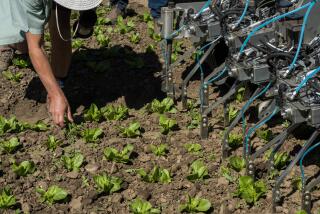U.S. Farmers to Plant More Biotech Crops This Year
- Share via
American farmers will plant more genetically engineered crops this year, including one-third of the corn on U.S. soil, shrugging off international resistance to biotech food.
The farmers are expected to grow more than 79 million acres of genetically engineered corn and soybeans, the nation’s two most widely planted commodities, a 13% increase from last year, the Agriculture Department said Thursday.
The gene-altered crops require fewer chemicals, making them easier and cheaper to grow. The crops are engineered to be toxic to insects or to be resistant to a popular weedkiller.
“Farming has become so competitive, so small margin, that if we can find something that works economically and environmentally, we’ll jump on it,” said Minnesota farmer Gerald Tumbleson, who grows biotech corn and soybeans.
About 74% of this year’s soy crop, or 54 million acres, will be genetically engineered, compared with 68% last year and 54% in 2000, the Agriculture Department said. Soy is a crucial ingredient for a variety of foods and, like corn, also is used for animal feed.
About 32% of the corn crop, or 25.3 million acres, will be biotech varieties, compared with 26% in 2001 and 25% the year before.
Strong consumer resistance to agricultural biotechnology has arisen in Europe and Japan, but most U.S.-grown corn and soybeans are used domestically.
“The farmer looks at it strictly from profitability,” said commodities analyst Don Roose. “They’re not shying away from it.”
About 10.5 million acres of cotton, or 71% of this year’s crop, will be bioengineered. Last year, 69% of the cotton was gene-altered.
Genetically engineered corn and cotton are considered better for the environment because they reduce the use of insecticides.
Biotech soybeans contain a bacterium gene that makes the crop immune to Roundup herbicide. To control weeds in conventional soybeans, farmers must either cultivate more often or spray more frequently with less powerful weedkillers; critics are concerned that Roundup is being used so much that weeds will develop resistance to it.
Thursday’s report “shows the continued high confidence that U.S. farmers have placed in seeds improved through biotechnology,” said Michael Phillips of the Biotechnology Industry Organization.
More to Read
Inside the business of entertainment
The Wide Shot brings you news, analysis and insights on everything from streaming wars to production — and what it all means for the future.
You may occasionally receive promotional content from the Los Angeles Times.










